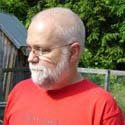A while back I invoked the doctrine of nominalism in an attempt to shoot down what I saw as a series of overly-broad political assertions. You noted that Wittgenstein is not a nominalist because he employs the analytical & descriptive tool of "family resemblences" among particulars. I agree that this is not classival nominalism, but it surely is nominalist in spirit, since family resemblences can evolve & change over time & have different configurations in different places. I'm not overly concerned with terminology, but it seems worthwhile to get this right.
What shall we call Wittgenstein? Again, I'm not sure the particular term is so important, though a term might serve us as a useful shorthand. In William Barrett's readinbg of W's "conventionalism" comes to the conclusion--at the end of Part 1 of The Illusion of Technique--that whatever linguistic reality we are able to parse, nature remains implacable.
. . . Therefore am I still
A lover of the meadows and the woods,
And mountains; and of all that we behold
From this green earth; of all the mighty world
Of eye and ear, both what they half-create,
And what perceive; well pleased to recognize
In nature and the language of the sense,
The anchor of my purest thoughts . . .
[Wordsworth, Tintern Abbey]
The poet, drawing on Edward Young's Night Thoughts, understand that the human world is not the world itself & yet the world itself lies at least partly outside human understanding--human being.
Philosophical Investigations
Christopher Robinson & Joseph Duemer read Wittgenstein's Philosophical Investigations


0 Comments:
Post a Comment
<< Home